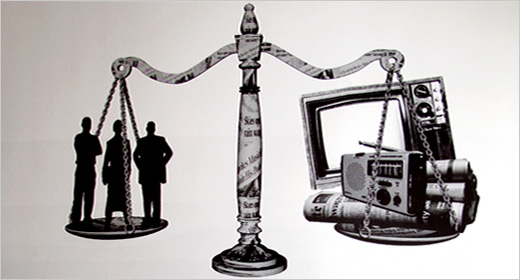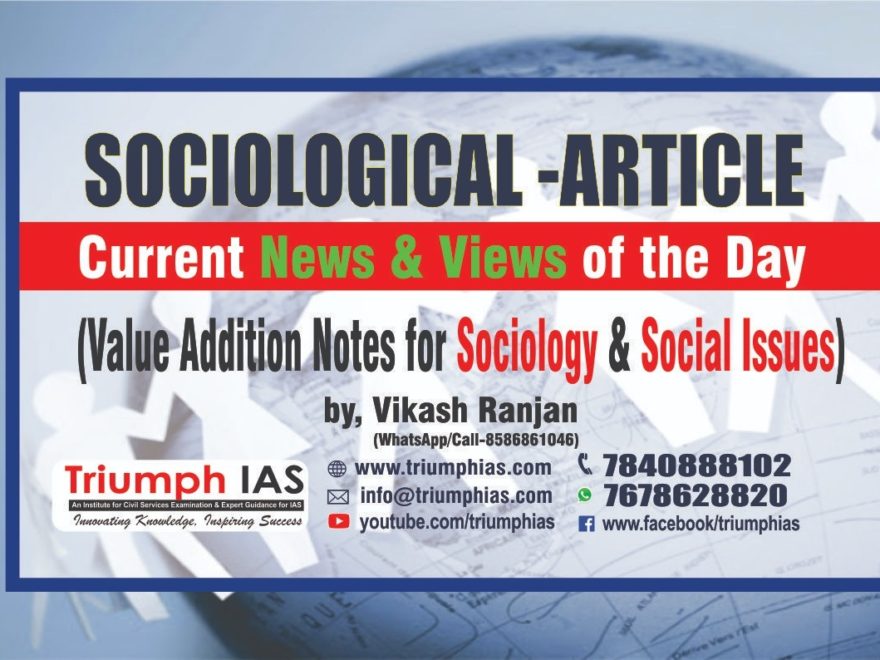Releant for GS paper-4 :
Media ethics is one of the divisions of ethics which deals with the specific principles and standards which media must follow, including broadcast media, film, theatre, arts, etc. Digital media ethics has sought nothing less than to address the ethical issues evoked by technological advances. Media ethics does involve promoting and defending all the values such as universal respect for life and rule of law and legality. The fundamental objective of journalism is to facilitate people with all the news and information on matters of public interest in a fair as well as accurate in an unbiased and decent manner and language.
It is ideal for journalists to present unbiased information to the masses. Truth, accuracy and objectivity are usually the common elements of journalism ethics across the world. The advent of journalism began with the invention of the printing press in 1450. From newsletters to pamphlets to broadsheets, print journalism underwent a gradual transformation. While the press is not a modern phenomenon, its role in society was clearly established during the Second World War which was considered to be a war for the survival of democracy. The Hutchins Commission headed by Robert Hutchins (then President of the University of Chicago) was founded for this exact purpose during the Second World War. It concluded its deliberations on the significance of the press in a modern democracy in 1947 (Wikipedia). It not only established the press as an independent Fourth Estate of democracy but also imposed on it a sense of social responsibility meaning that the press is supposed to provide accurate information to citizens so that they can govern themselves. However, it is important to note that the printing press being a product of the Renaissance in Europe, the foundations of journalism can be initially sourced to European values. Colonialism only helped to propagate this influence by training natives of European colonies in the ways of journalism envisaged in Europe. Also, globalization – which may be disputed to be another name for westernization, has accelerated the privileging of Western journalistic norms (Hanitzch et al., 2019).
Thus, while countries newly independent from colonisation might have been able to recover better if they pursued development journalism in cooperation with the government, to do so as per Western ethics meant a stifling of the freedom of the press (ibid.). Context is always important in deciding what is necessary for a particular region. Therefore, it is not only adequate to take into account the regional socio-economic inequalities but also global inequalities among countries. While globalization has made the international exchange of information and resources more accessible, journalism tends to prioritise the regional over global to cater to the needs of the regional population. Political, economic and organizational influences were found to be the strongest indicators of differences among national journalistic cultures. Such influences were found to be stronger in less developed countries (Hanitzch et al., 2019). Some issues of such influences were journalists’ safety and issues of impunity, heavy censorship and media bans (ibid.). The killing of Jamal Khashoggi, a Saudi-Arabian journalist known for dissenting against the rulers of the state and Gauri Lankesh, an outspoken Indian journalist supports the abovementioned statements. Moreover, the increasing targeted killings of journalists in South America, middle-east, Asia portray a worrying pattern of suppressing press freedom across the world .

With the onset of online journalism, consumers are often allowed to select their preferences for news on particular topics which tends to increase bias and polarization (Wikipedia). Also, with increasing ease of access to technology, it is necessary to lay down certain guidelines for their appropriate use. Normal citizens now have the ability to capture images and videos of events with their devices and post them on social media platforms. While it definitely allows for the expansion of our awareness, especially for particular events not covered by press organizations, there is also a high probability of fake and edited images and videos being accepted as authentic. Not only is it an arduous task to separate the authentic from the fake, but it also has the potential to increase polarization among groups leading to extreme acts of violence. Such instances have become commonplace in contemporary India where false allegations of possession of beef against certain people have resulted in mob lynchings and other acts of violence. The role of alternative media becomes even more significant when it comes to investigating the truth behind online news posts. The rise of social media has increased the spread of fake news which has the potential to bring about distrust in serious media coverage (Wikipedia). There is a growing apathy for news and politics among the youth in several countries
The entertainment industry has always been the platform for conducting bold experiments in the moral sphere as well as selling ideas which obey the normative order of society. While popularizing the moral norms of society establish stereotypes firmly in social interactions, violating and criticizing the prevalent morals can be viewed as ethical violations as per the corresponding moral obligations.
Ethical dilemmas arise due to the fact that society is dynamic in nature and constant social interaction gives rise to new ideas, norms and standards which challenge the old ones. The persistent shaping and re-shaping of what is considered ethical will inevitably maintain grey areas. Moreover, as stated before, all moral standards and ethical guidelines need to be relooked at to remove any Western bias. The social and cultural contexts must always be upheld while establishing any form of normative guidelines.

